#your tag is also special
Text

the juxtaposition between "it's pronounced Fae of Maleficence, but it means Blessing!" is sure an interesting choice there, Mal.
still not 100% happy with this one, but I know I keep overworking it, so I think I need to just be done! getting all the important elements in without overcrowding it turned out to be more of a challenge than I anticipated. :')
(also, we're going to have to wait at least a month to find out what it even does exactly, uggghhh I'm so impatient)
#art#twisted wonderland#twisted wonderland episode 7 spoilers#twisted wonderland book 7 spoilers#unique magic posters#<- i made a tag for them!#i wanted this one to be special because it's a big story moment#and also he's my special little guy#but perfect is the enemy of good and murder your darlings and all that#sometimes you just gotta be done! and that's okay!
4K notes
·
View notes
Text
batman : prodigal (1998)

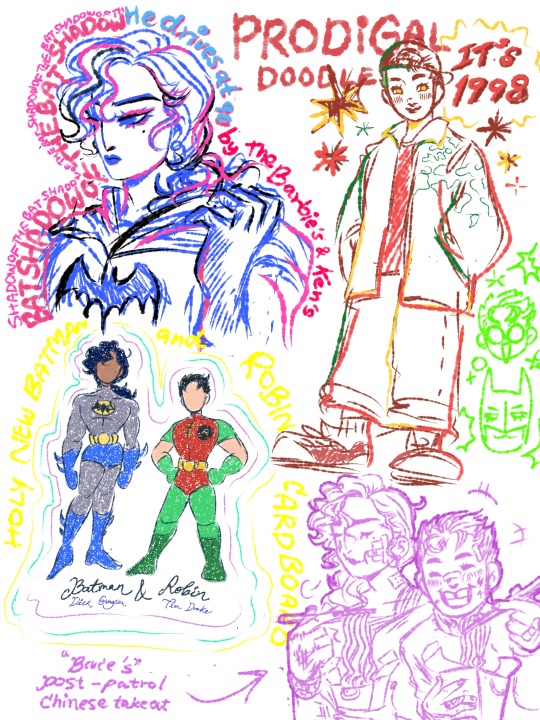

(bruce's chinese takeout ref ⬇️)
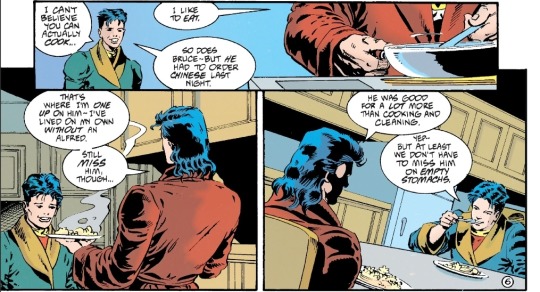
#YOOO IM BACK#WITH THE PEAKEST REALEST BATMAN COMICS EVER#have y'all ever feel like missing your little brother just by reading any timmy 90's comics bc i do#man that boy's WILD#and also BATDICK#hmmm#batman fanart#dc comics#dick grayson#tim drake#batman prodigal#robin tim drake#he's so special to me if y'all even care#dick and tim#they have their own tag???? served ig!?#THE BROTHERS EVER
173 notes
·
View notes
Text
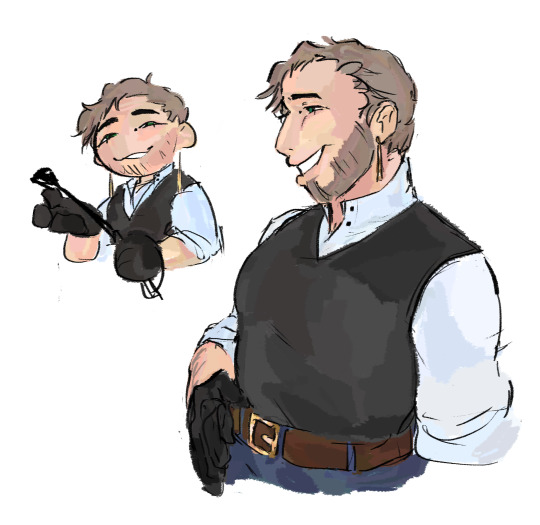
hey guys. remy design
#remy the farmer#dol#my art#sorry it took so long for me to make this#im watching live shows for one of my favorite music projects in the corner and i have to pause drawing to scream every 5 seconds#if i were in that crowd id be yelling. id faint. only but a dream to attend one of these#to the people that sent me another personality swap request also. i promise im not ignoring you but the one that said#''avery and eden swap would be a nightmare''#youre completely right. it is a nightmare. i cant think of anything#so if either of you have any more ideas or anyone else does then PLEASE help me im begging you all i can think of is ??? i dont know#i hope you guys like this remy though#i was worried about if it was good enough but special thanks to the people on my side account that told me it was fine#i posted fem remy there too if you want to see it#i think when i do fem vers of them all ill group them up because itll take me less time to make it since ill already have the design basis#and also i feel bad for spamming you guys#actually would you prefer i keep posting them one by one or should i post them all at once? for these designs#i feel bad posting separately because that means the people who rb my posts reblog like 10 separate design posts in a row :(#and i dont want them to spam their blogs because of me#but i do really really appreciate it when i see someone do that in my notifs :) so thank you a lot if you do#and also thank you to everyone who leaves tags i read each and every one of them obsessively like a freak#this is getting too long im going to hit the tag limit at this rate#ill try to work on the avery eden thing again#see you all later :)
102 notes
·
View notes
Text
it's interesting how every trait that ppl use to demonize narcissists (except for the ridiculous ones to demonize that are actually harmless) is also very prevalent among the general population, especially among untraumatized and privileged individuals
like yeah, *some* narcissists are assholes, but the traits that make them assholes are extremely common among people who don't have NPD and were simply never told they have to care about other people
it's like neurotypicals/egotypicals will accept this sort of behavior *unless* it was developed as a coping mechanism. Like it's only bad if it's a symptom of mental illness. And fuck that.
#Oh you think you're better than others bc your parents told you being white makes you superior?#Well let's give you some education and space to learn and shame POC for not wanting to be around you!#Oh you think you're better than others because you've experienced horrific abuse and had to convince yourself you're special in order to...#Survive? Wow you must be a terrible person! /s#Idk if it's a good idea to tag this as narc safe#Bc while I am saying these arguments are bad I am still talking abt them#Also ftr the traits I mention in the parentheses are like... Being obsessed with ones reflection#I've seen that used to demonize narcissists but like who does it harm???
103 notes
·
View notes
Text
Okay I’m gonna post something controversial
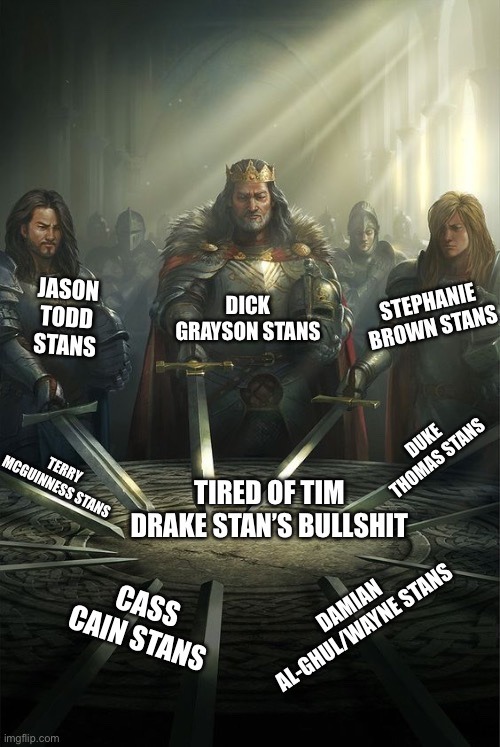
#I KNOW THERES A TYPO LEAVE ME ALONE#anti tim drake#god I finally get to use that tag#listen. I don’t want to piss in anyone’s cereal. but I’ve seen polls that got flooded by t*m fans#oooooohooooooo the poor baby ooohoohogogooogkdjf shut up#if there are 1000 Tim drake haters I am one of them. if there are five Tim drake haters I am one of them. if there are no Tim drake haters?#I’m dead.#I’m so tired of both him and his fans#HE AINT THAT GREAT#also god. I’m a jason fan and I can’t imagine being a duke fan or a cass fan#watching them get erased for any of the ‘’main’’ bat boys#that shit would be infuriating#as a Jason fan I apologize :( I also love your special little guys and gals#they! deserve! better!
222 notes
·
View notes
Photo

“why are you always only ever talking about, like, spider-man 2099’s childhood and mental health issues instead of posting panels of him Biting People” uh. because... spider-man 2099 the comic book... also does this.?
#talking tag#spider-man 2099#spiderman 2099#miguel o'hara#xina kwan#marvel#comics#comic panels#i earnestly am not trying 2 gatekeep here lol i Desperately Want people to read spider-man 2099 and ALSO Like The Thing I Really Really Like#but. (deeply bitter) The Internet Does As The Internet Is i guess.#plus i Already Have posted every single panel of him Biting People that currently exists. and then ppl left viscerally uncomfortable tags.#..well. Viscerally Uncomfortable for Me. obv the people Leaving those additions seemed pleased as punch to publicly puke em onto my lap.#urgh woof i Know it's a Bad Idea 2 bring attention 2 it bcuz this specific breed of Pest thrives on Attention but like. i am so Tired#like one of those panels was an instance of the main character rebuffing an attempted assault Put Your Pants On And Quit Moaning. Christ.#this is My Personal Blog. i post abt this comic because im autistic and it's been my special interest for going on like 10yrs.#if i decide i want to Stop Posting about it then i will just Stop Posting About It. and i will tell people Why if it is for any reason.#but i just. /jesus/ yall. go be intolerably Straight somewhere else. my house isnt the place for that i just Block Creeps.
209 notes
·
View notes
Text

he’s friend shaped 🐻
#the way my procrastination is going I’m gonna make my way through the whole lineup at this point#do we think Benny is an otter or perhaps some kind of mink#I’m trying not to think too hard about why i have such a desire to draw the toronto maple leafs as woodland creatues.#i don't question the muse tho#so. have some Joe Woll :)#wolly#L#art#my art#also special thanks to @tiger-balm bc your tags on that one bear post inspired me
39 notes
·
View notes
Text


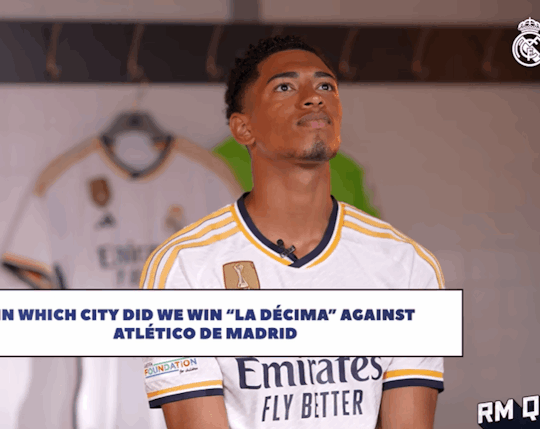
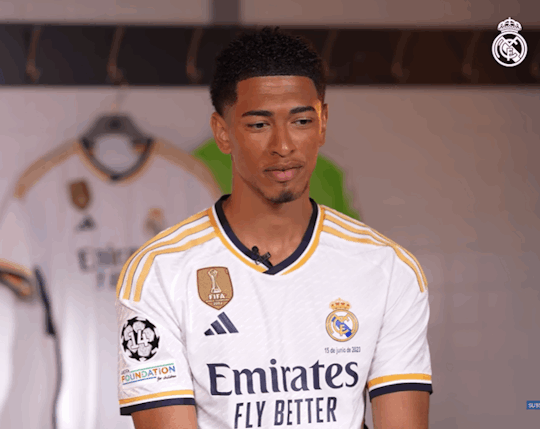
from Real Madrid quiz
#jude bellingham#I'm gonna need a new tag here#and it will be#special english baby#:D#he's cute af#another records-breaking kid :D#the parallels are blowing my mind rn#so funny to watch his interviews and to listen about how important it is 'to play with a smile on your face' :D#not even surprised he's picked my interest :D#real madrid#football#and also - dear god my filtered tags list here and permanent filters list on ao3 just got ... longer 🤦😂#fandom struggles
36 notes
·
View notes
Text
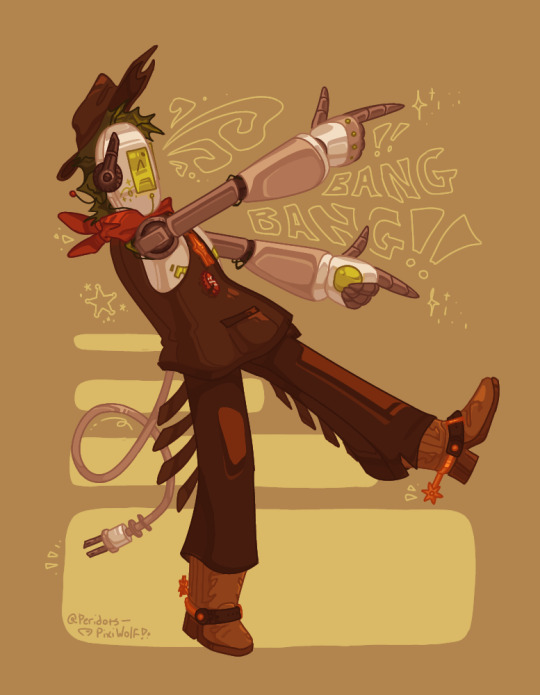
[Start ID. A drawing of @mieczmaszyna 's character Izzy. In the words of its creator, Izzy is a humanoid robot with a white chassis, oval head, black headset, square green glasses, claws, and a tail resembling a cable plug. Ai wears a cowboy hat, vest decorated by a star and bottle cap, pants with tassels, spurred boots, and a red bandanna. He's viewed from the side, kicking up one leg and holding both arms out in front of itself to shoot finger guns, looking excited and rather jaunty. The background is a dull yellow-green, muddied by the warm reddish tone of the drawing, and in paler green are the words "BANG BANG!!" by ais arms. End ID]
robot cowboy!!!
#peridots-art#bots#others' ocs#izzy#mieczmaszyna#gotta admit doing all the shading here was. very fun. insert medic hoo noise#i don't know if people usually read these but @ the intended recipient of this post! if you are!!#i remember first liking your art a year ago (actually only about a week off now lol) when it crossed my dash for the first (/only) time#and then found it again whilst enjoying the funky robot dudes (yesm/p03) and their respective games and I fell in Love with your style#i also was always enthused by the number of my fixations that you also liked! fnv! insc! ultkll! tf2 and hylics which i've never played!#and then there's hk which has been my most prominent special interest for close to two years so. safe to say that was. AWESOME to see#ALSO ALSO!! i think we may be like. mutuals-in-law*2??#by which i mean one of my two closest friends on this site (holly) is mutuals with a cool artist (sodapop)#who i learned by accident that you've sent asks to before. either way it's cool :]#reserving the caption 'robot cowboys my beloved' for the future cause there are too many! victor and p03 and my own guy atoya and now this?#it is a wonderful problem. anyway i'm also looking at P3RI and realizing how many traits they and izzy share by accident lol#think. that should be all the tags (see: incoherent rambling). really like your stuff and have been meaning to draw something for you for#a while just got nervous 👍
233 notes
·
View notes
Note
Some of the posts you've reblogged lately have clarified some of my thinking about how Gaiman has reworked the characters from the original text. In the novel, Aziraphale and Crowley have at base the /same/ flaw: they evade thinking about the ramifications of their actions by displacing everything onto their "job" requirements. To which the novel says, no can do. Aziraphale has his moral epiphany at the airfield before Crowley does, but it is by and large the same epiphany. Most of the rhetoric about offloading responsibility goes to Crowley, either directly or in free indirect discourse, but he's also the dominant viewpoint character of the two. For that matter, we are told how Crowley /feels/ about where Aziraphale has led him, morally speaking, but we aren't privy to Aziraphale's interiority during this moment. In a sense, though, that doesn't matter, because there's no reason to believe that the sense of liberation is any different.
In the series, though, Gaiman ramps up the tension in S1 and S2 by splitting up their problems. Crowley still has the "but it's not my FAULT" moral flaw, considerably amplified with even more suspiciously unreliable narration, and he still thinks about his work for "head office" as just that, a job. But Gaiman rewrites Aziraphale so that, as other people have pointed out, he thinks about being an angel as an identity (and being a demon, for that matter). I think you can make a good case that unlike in the novel, in the series neither character fully grasps how the other conceptualizes himself. This is one of the reasons that the novel's moral epiphany doesn't happen in S1, and can't happen in the same way in S3. Crowley nudges Aziraphale as though he were nudging him out of a job, not as though he's nudging him into an entirely different sense of personhood. Aziraphale praises Crowley's goodness because he essentializes it, seeing it as a sign that Crowley's demonself is continuous with his former angelself ("you were an angel once"). In S2e1, we have the very telling dialogue in the coffee shop where Crowley knows all of Aziraphale's "voices," but doesn't understand why it ought to set off fire alarms for him that Aziraphale so needs to report to him for praise. This sits alongside the tension in the Job minisode, in which Crowley is openly disaffected with both Heaven and Hell, but doesn't see the situation in the same existential terms as Aziraphale does. The end result is the S2e6 car crash, in which each character proposes to the other in a way that solves their /own/problem.
LWA i’m guessing that this is you - let’s face it, noone else sends me asks like this - but by some chance that it isn’t, congratulations anon you sound just like them (and now i’m slightly terrified that there might be two of you lurking around my blog).
also - apologies that it took such a long while to come back to you; my original response was approaching half a dozen pages just for aziraphale alone (and i wasn’t done by a long shot), and then i remembered to great disappointment that tumblr isn’t exactly the forum for such a long post (future rhi: haha you played yourself, this is still a mammoth response). at which point, i basically had to rewrite it all over again, condensing it (future rhi: you failed) down into what i’m hoping are my key points. i wish i was joking when i say that you’re currently reading what is probably the fourth or fifth version of this response.
i think where a lot of disconnect happens in how we view aziraphale’s journey throughout both seasons stems from thinking that the concept of being an angel is all-encompassing, instead of potentially also being multiple layers that aziraphale has steadily been shedding throughout the story. personally, i think there are three distinct areas around aziraphale’s identity as an angel; heaven, god, and being good. a lot of these overlap and intertwine with each other, for sure, but i think it's too much to ask of aziraphale, as the audience (and crowley), to be able to abandon it altogether in one fell swoop. being an angel is not the whole of what aziraphale is - this much is evident - but to his mind, it's the core. dismantling that, stepping away from that, and finding who he is might be without the overarching expectation and pressure of being an angel is no doubt terrifying... and potentially we're not giving that struggle enough credit.
to my mind, he disconnects from heaven fairly early on in the narrative, as far back as job, and continues through the ages with a sense of fear - or, at best, trepidation - from them. however, this tenuous allegiance carries through to s1 when it severs entirely with the call to the metatron; i truly do not see any instance after this point chronologically where aziraphale has any fondness or loyalty to heaven as the institution, nor the archangels. he is unique in being an angel that has experienced the fullness of earth and humanity, and this has influenced him fundamentally into being an angel that is so 'other' from his peers that he's by default unrecognisable, almost alien, and is deprecated and dismissed as a result. it's the very first modern scene we see of him in s1 - putting him in direct contrast with gabriel (arguably The angel of abrahamic religion; the one that nearly everyone recognises, and considers to be the epitome of What An Angel Should Be). crowley has similarly influenced him through the ages; he's made aziraphale think outside of the dogma that heaven instils as being the irreproachable, righteous, Good Side - as well as encourage him in his hedonism and self-interest (literally the reason why they both endeavour to stop the apocalypse in the first place) because it is important to aziraphale personally, and he takes pleasure and happiness from it. aziraphale "[keeps] up appearances" for the sake of complying with heaven and not raising suspicion, but is ultimately "an angel who goes along with heaven as far as he can".
aziraphale's relationship with god is little more complicated, but again - i think aziraphale reaches the stage where he is shown time and time again that god chooses to be distant, and not to act or intervene*, which is something aziraphale cannot fully reconcile. as he sees it, hell does bad things (as does heaven, as is demonstrated with the apocalypse), and where you have the power to stop it, you should. equally, if you have the power to do something good, you should do it. he takes literal issue with this in job, where he learns that god is resolutely refusing to intervene in whatever hell is cooking up for job and his family, and he instead chooses to defy this and go to crawly to beseech him to not hurt them (obviously not realising that crawly has reached that page already). he holds out hope that god will do the right thing, but the storm comes from hell, starts early even, and god does not stop it - would not have stopped it, even if the children were above, and not in the cellar.
he cannot reach any other conclusion than crawly must be right, and god in fact wants the children to die. when it comes to the lie, and aziraphale resigning himself to falling for it, i do wonder how he reconciles this after he doesn't fall - my thought currently is that aziraphale believes that god has seen his 'transgression', and chosen clemency - to forgive it - but aziraphale fears she may not do so again. it makes sense that aziraphale then is so resistant to the Arrangement later on, and then why he appears so set on not helping thwart the apocalypse because that would be going against the plan (despite, yk, evidently agreeing with crowley and privately wanting to stop it as much as crowley does). this is once again shattered by the call to the metatron; aziraphale holds out hope that the almighty will fix everything, surely this is the time where they would intervene, job and his family is one thing, but destroy the entirety of their creation? but... god won't even get on the call with him. that to me is, once again, where aziraphale lets go that particular strand of what makes him an angel - as far as i can recall, we see no instances in 2023 where aziraphale declares any outright loyalty to god or to heaven*, even going so far as to initially reject heaven (and god, presumably, by extension) - "i don't believe there's anything left to be said, i've made my position quite clear" - until he is given the opportunity to... fix it? improve it? mend it? restore it? semantics, but "make a difference" plainly recognises that how it currently exists, or how it currently functions, is wrong.
*although, ultimately, this is arguably the only moral solution for god as far as humanity is concerned. an omnipotent and omniscient being should not get involved, nor even a vaguely powerful one (i'll take "free will" for 500, alex).
*i've said it before and i'll say it again; where aziraphale says "but heaven! it's the side of truth, of light, of good", this to me is not aziraphale saying that heaven is itself good. that would be in direct conflict with his willingness to "make a difference". if he thought heaven was perfect as it is, 'making a difference' wouldn't even come into it. to that end, he knows it isn't - and instead i see it that aziraphale thinks these are the qualities that heaven stands for, what it ought to be... not what it currently is.
last thing on god: aziraphale even literally steps into god's shoes in ep5, during the ball - it's all very well, admirable even, that he hosts and crafts the ball to be a curated environment where maggie and nina might realise that they have fallen in love with each other, he thinks he's doing the right thing by intervening... by getting involved. but as you say, the book epiphany hasn't happened for them at the end of s1, not even in s2, and aziraphale hasn't learn the lesson of why "messin' about" might actually be the wrong thing to do. in fucking about with the ball, he completely tampers with the free will of not only the girls, but everyone else. nina reflects this back at him, and it visibly unnerves him that she does so; he is removing free will from all present (or, attempting to in nina's case), but is doing what he considers to be right and ergo what he thinks god should do (in his eyes). he doesn't reach the free will realisation, at least not as far as is evident to the audience, and it is clear that when the issues surrounding playing god are highlighted to him (by both nina and crowley), he chooses to dismiss it. he is doing what he thinks is right, but in doing so is literally demonstrating the shortcomings he has in his faith in god.
but aziraphale and the concept of goodness? ah. this, to me, is still the key part of his identity that he is struggling to let go of. aziraphale by the point of s2 accepts that he is not perfect. the first meaningful scene we see of aziraphale in the post-s1 timeline is his interaction with maggie; he forgives the rent, does a kind and compassionate thing, but very readily recognises that he did it for his own self-interested motivations and prioritising himself first (so far as to look uncomfortable when thanked for it by maggie, and referred to as an “angel” as a result - aziraphale knows that his motivation was not angelic at all). a ‘younger’ aziraphale, i do not think, would have so openly admitted to this, and instead would have laboured it as a purely selfless, kind, and benevolent thing on his part... and it would have taken crowley probing further to get it out of him that he did it out of self-interest. this doesn’t preclude that aziraphale was being kind to maggie - kindness is in the perception, not the intention (imo) - but he accepts his shortcomings as far as being an angel is concerned, and the freedom of breaking away from heaven grants him the freedom to do so. but contrast this with his taking-in of gabriel. aziraphale is not stupid, and is evidently frightened, anxious, and suspicious of him turning up at the bookshop, but what becomes clear to him is that this is genuinely someone under threat, in trouble, and lost; yes, he gets frustrated with the situation, but he offers gabriel/jim sanctuary, and is set in this decision before crowley even enters the picture. he makes the clear assessment that the wanker-that-is-gabriel is not the being sat before him, and instead chooses the route of kindness.
aziraphale is not always a good person, and there are multiple instances where this is proven, but there are equally just as many instances that show that he is - and i think he accepts that he is someone that is a mixture of both. that being said, this is still something that he is self-conscious about (if shax's jibes at him in ep6 is anything to go by), but it stems more from a place of aziraphale feeling that he is not enough for heaven, or for god - that even, perhaps, he doesn't deserve to be an angel; i don't think it's out of place to say you can accept the traits that make it so you do not fit in (and in fact be glad that you do not), and yet still feel ashamed and anguished that you have been rejected for the same. there is a case to be made that this in part may be why he accepts the metatron's offer to return to heaven and run it - that it's an offer from the voice of god himself, in acceptance of who aziraphale currently is - but i do wonder how far aziraphale believes this.
now is finally time to start bridging the gap to crowley, because it is clear that being good is paramount to aziraphale. however, the issue is that the sense of being good is paramount, and he still conflates it with what is right. crowley is not to blame for this, but he is undoubtedly a guiding principle in how aziraphale develops this sense; crowley constantly challenges aziraphale on his rigid, often deontological mindset of "the action must be good for it to be the right thing", and instead makes him consider the wider, consequentialist picture; that sometimes, "the action might be a bad thing, but if it results in a good thing, that is the right thing". he reaches, therefore, the conclusion that if crowley ends up doing the right thing, he therefore must be good - and ignores all of the events, all of crowley's behaviour, that point to the contrary. hell, he even ignores all of crowley's own protestations to the contrary. as you say, aziraphale essentialises it.
maybe aziraphale does think that crowley is, at his core, the same person he was as an angel, but... personally, idk how far i currently interpret this to be the case (my thoughts are more along the lines of 'crowley is, regardless of being an angel or a demon, a good person, and that's what counts', but maybe i'm optimistically giving aziraphale more credit than is due). in any case, upon reflection, aziraphale has not learnt from the 'shades of grey' argument... not in relation to crowley. sure, i think aziraphale accepts that he himself is a light shade of grey, but crowley? i don't think he fully comprehends that that same school of thought must apply to crowley too - crowley is not a wholly good person, but arguably is an often dark one who sometimes chooses to do good things/knows when not to cross the line - and therefore lands on the expectation that crowley would return to heaven with him to do good - because that's the right thing for a good person to do. aziraphale has turned to crowley, and holds him to the same ideal to which he previously held in heaven, and arguably in god. these are entities that aziraphale thinks ought to stand, and perhaps originally stood, for "truth, light, and good", and when that went down the shitter in reality, aziraphale has turned to his own reality and found crowley instead. the faith - and comfort that it brings - had to go somewhere. that is not a responsibility crowley should shoulder, under any circumstance, but in not recognising that aziraphale is doing it, aziraphale hasn't been dissuaded from it either.
but hey, let's finally discuss crowley (and if you're still reading... incredible). look, i've made no secret of my... criticism? of crowley, and to reiterate not only what you said in your ask, but also what we've discussed at length; crowley is not a reliable narrator. this, regrettably, makes me reconsider accepting what are posed as core principles of crowley's character. he does not give a consistent account of the fall; whilst what he does say may be, at best, piecemeal snapshots of the events that led to his fall and, at worst, be completely false altogether, the conclusion is the same - there is something missing, and i'd wager that it is something that he doesn't want to admit, confront, and/or reconcile with. add this to his reluctance, or outright refusal, to accept accountability for his actions on a number of occasions, as well as his tendency to skirt around or fudge the truth, and i naturally do not default to taking his word as gospel; that's not to say that i think he has a nefarious, hidden agenda hiding away (obviously not), or is an entirely reprehensible character, but from an audience perspective i think if we're to anticipate some Major Revelations in s3, this is a key place to start.
one quote, from s1, that sticks out to me is, "crowley was all in favour of armageddon in general terms, but it was one thing to bring it about, and another for it to actually happen." this literally is the summary, for me, of all of crowley's ouroboros/boomerang/"this will no doubt come back around to bite me on the ass" characterisation. if i (contrivedly) rephrase this, it reads to me as 'i'm not that bothered about the end of the world and humanity in theory, and happy to add in bits and pieces that would make it happen, but i will have an issue as soon as we start gearing up to press the big red button'. as such, i think we have to contend with the fact that crowley may not be as moral as has been widely accepted. maybe i'm assuming too much, but if you were truly of moral standing, presumably even the notion of setting out plans to destroy the earth would be a big no-no, if you are in fact against the apocalyse because it would mean the destruction of humanity. but of course, this would presume that crowley has any way in which he can viably refuse (which, he doesn't) - to which end, therein lies the dichotomy of the nuremberg argument. is it an immoral action when you don't have the room to consider the moral option? regardless, does that absolve you of consequence?
this would also, presumably, be at odds with AWCW's objections to armageddon as put to us in the pre-fall scene, right? so, to me, the conclusion i reach is this; first, that AWCW obviously does not want the stars, the universe, to disintegrate as a mere bookmark in the wider 'great plan', but this does not come from an altruistic viewpoint; it comes from a more selfish one. and that's totally fair - i probably too would have issues with spending my entire (and at this time, 'entire' is unquantified) existence building and creating, only to see all of my work go down the drain as if it's nothing. but - i do not see it as him having any ulterior, selfless consideration for humanity. second, crowley likes earth, but for the convenient and clever things that exists because of - and in concurrence with - humanity. the reasoning he gives to aziraphale for stopping the apocalypse is just as true for him as it is for aziraphale. there is the line of "you said you would be testing them, but you shouldn't test them to destruction...", an echo of his sentiment at the flood, that gives weight to crowley privately wanting to stop armageddon for humanity's sake. i agree with this assessment on the whole; that crowley holds it as an equally strong and valid reason for thwarting it. but i think it is also fair to at least suggest that this reasoning may also stem from crowley's own personal feelings about the fall - a group of angels that were, presumably, tested to the point of their own destruction - and how god, in his eyes, perhaps should have learnt from that event before planning to do the same to her Ultimate Creation. this, for me, is a little more in line with his characterisation as has been presented so far.
but then again, crawly seems to be acting selflessly in the job minisode. i, once again, am largely inclined to agree... but for the sake of exploration, i do wonder how far it's entirely selfless, or altruistic, and instead how far it's a projection of thwarting god in the sense of rectifying his own punishment. a case of 'i went through this and it's shit, humanity doesn't deserve the same thing the same thing to happen to them', vs. 'i went through this and it's shit, and now she's up to the same old bollocks because she's awful, so im going to thwart it as a big fuck you to god'. maybe there is no real distinction, or maybe it's a bit of both at the same time, but the former would more strongly suggest to me that, looking at the parallel between job and the fall, crowley was the entirely innocent party in his fall just as humanity is/was, which i don't personally buy. 1827 and preventing elspeth's suicide is a little closer to the mark where selflessness is concerned; "you have sinned very bigly - trying to kill yourself?! it's not on!" strikes me that crowley is now acting out of the interest of keeping elspeth out of hell, where it is pretty clear Bad Things occur. there are other clear instances of good too* - he gets the humans out of bookshop in ep5 and brings back mr brown from hell, he treats jim with kindness once he establishes for his own peace of mind that he's not a threat, and he protects maggie from being accosted by demons (and this is not to mention how he, on the whole, treats aziraphale). suffice to say, crowley is clearly capable of selflessness, and doing both the good and right thing, but i do think that he doesn't necessarily act with selflessness and goodness as his default motivation. there are enough instances to suggest that he isn't a completely moral character.
*now that im thinking about it, it seems that it's largely when the threat of hell specifically looms that crowley is at his most selfless..? hmm.
crowley does centre around the thinking that being an angel/demon as like a job - and tbf to him, it's not an overly out-there conclusion to arrive at. heaven and hell are presented as corporations and they're referred to as "head office", he is given a workload and told to report back, he stretches the truth about what work he is personally responsible for in those reports, and crowley describes himself as a 'former demon' (as if he ever stopped being one - even as a fact of being, he is a demon). so yeah - to him, it is a job. and as you say, he assumes that aziraphale sees it the exact same way which, clearly, he doesn't. crowley states that he never asked to be a demon which may well be true, but it's equally possible that he was given the option to step away from heaven and god, and took it (not knowing that becoming a demon would be the result), to my mind, it's almost like he got sacked from a start-up because he didn't like the direction the company was going and Had Things To Say/actively resisted and denounced it, and then was forced to work in a - in multiple ways - a worse work environment. it's an understatement to say that he's under no illusions that hell is awful, and he too "goes along with [them] as far as he can". however, i'm not entirely sure that we have reached where crowley has his "as far he can" moment like aziraphale has - the fact that he says to aziraphale he said no to hell, when he absolutely didn't, rings alarm bells.
as explained above, aziraphale doesn't see it in this way at all; what i think crowley finds difficult to understand is that aziraphale's experience of being an angel is very much different to crowley's. aziraphale has existed for millennia on earth as an angel, and aziraphale’s purpose and meaning is wrapped up in being an angel, in everything that it entails, and specifically being an angel that has walked amongst humanity. just as aziraphale is never fully able to empathise with crowley’s position as a demon, and all that occurred to get him there, crowley is just as unlikely to fully empathise with the importance aziraphale places on his own angelhood. in comparison to crowley's situation in being sacked from a start-up, a hypothetical fall for aziraphale would be like being sacked from a business that, whilst you may not agree with them in the majority, has provided you with a career that is the only thing you know how to do, continues to pay for your home and benefits, and without it would leave you stripped of any purpose and meaning, and no idea on what it makes you/where it leaves you without it. and even then this doesn't really scratch the surface - again, aziraphale doesn't see being an angel as being a job.
the final fifteen is where all this comes to the surface. when the two of them individually have their backs against the wall, with no discernible way out, they have very different responses. aziraphale fights, and crowley flees. heaven is a seemingly insurmountable problem that stands in the way of them being left alone (and being together). aziraphale's response is to try to change it, to fight. crowley's response is instead to flee the situation entirely. this is the same with armageddon - another seemingly insurmountable problem - where aziraphale's response is to go above everyone's heads and dial 9-9-god, and crowley's response is to flee. neither of these responses are wrong, both are completely valid, and i genuinely think it is equally possible to see the situation from their individual perspectives. but neither of them understand the other's. aziraphale, who sees crowley as a good person who will do the right thing, doesn't understand why crowley won't fight with him, won't do (as he sees it) the right thing in making heaven what it always should have been, and is instead choosing to flee. crowley, who sees aziraphale as someone who like him as quit his job and wants nothing more to do with either of their former bosses, doesn't understand why aziraphale is choosing to fight, won't prioritise them, and won't go off with him. once again, both are equally valid thought processes to have, but are borne out of being rather significantly off the mark in understanding the other, and instead thinking that the other will act in accordance to what they individually believe the other to be.
#i missed out so much in this and haven't explained my thoughts very well but i couldnt let it get any longer i simply couldn't#also LWA if you'd be so kind as to confirm this is you (or not) - just so i know if this ask needs to be added to your special hyperlink#ta very much#good omens#ask#honestly this is just All of the meta so will just simply keep it tagged to the characters:#aziraphale meta#crowley meta
40 notes
·
View notes
Text
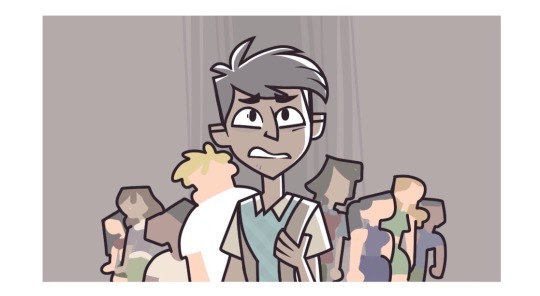
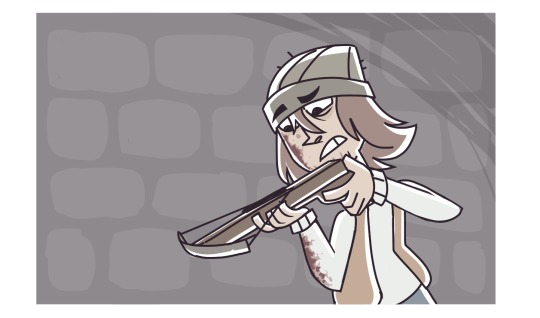
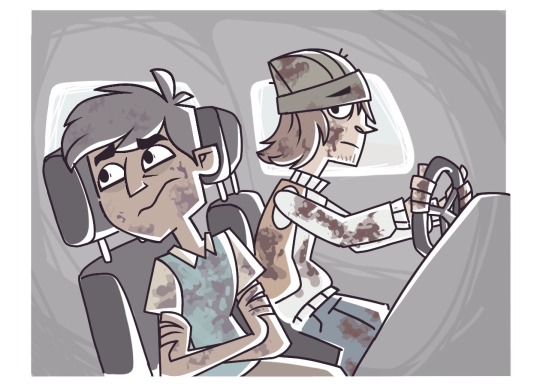
Fanart of the first two chapters of “A Guide To Surviving The Apocalypse” by @noahtally-famous
Plz plz plz go read it it’s very very good and I’m really interested in seeing where it goes <3
#total drama#td Dave#td shawn#dashawn#tw blood#tw unsanitary#I mean zombie blood is unsanitary isn’t it?#also#review time in the tags#my favorite dashawn fic ever and like they aren’t even like friends yet#I rlly like the characterization in it. Shawn specially because I often see him mis-characterized in fics#also at least I feel the fic does a good job keeping the tone serious but not nihilistic. characters still have hopes and fun and find joy#I love that#also it really gets a good idea of Dave and Shawn’s dynamic and what makes them work together which is so important#kit your fic is wonderful I hope I’ve made that clear <33
123 notes
·
View notes
Text
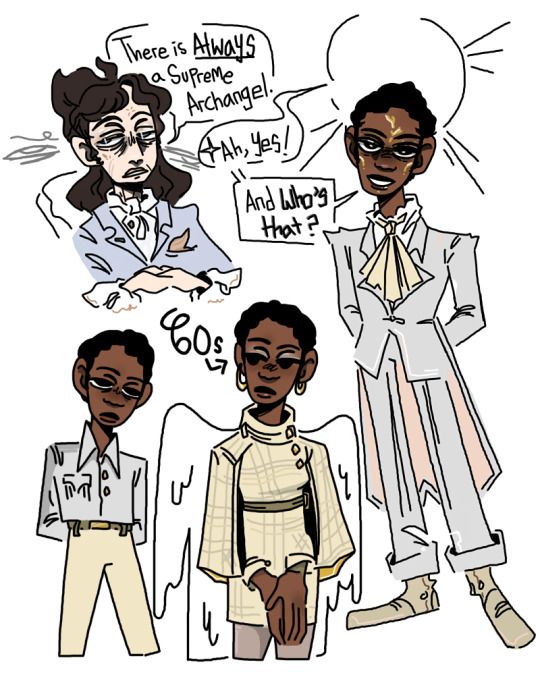
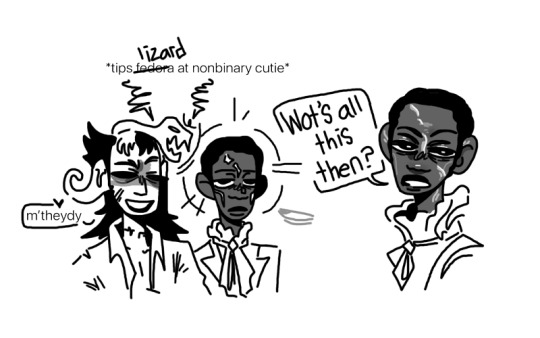
If Uriel said I think too much I'd get a lobotomy
#good omens#Uriel#good omens Uriel#I don't watch the show - literally just picked the prettiest angel and watched some clips#literally the first clip I saw was Uriel and the other two ganging up on Aziraphale like they were all in the mob HEHEH#sometimes Uriel has gold things on her(?) face - sometimes they(?) don't v_v#I drew both bc I thought maybe the 'sans gold' look was part of a human disguise#Michael - special shoutout for your fucked up hair <3 who's your barber king?? Fire them <3#also that demon isnt any real demon on the show I just doodled whatever#did NOT expect Uriel to be british but its okay - we all have our flaws#bea art tag#good omens art#OH one last thing: the top leftmost Uriel was on a layer called 'bad vibes Uriel'#also I miiight draw Uriel more bc they're very pretty and also I don't feel I got their sleepy eyed you-done-yet-? look down ...
95 notes
·
View notes
Note
idk I was kinda thinking of trying the new pokemon anime but seeing u get so creepily obssessed with the explores these past weeks has kind of killed my interest in watching it tbh. I was hoping that after working urself into a frenzy every single week because you thought a side character villian would show up ud get a clue about how weird this was making u but I guess not. But yea I saw how creepy people got about the first anime, not doing that again, no thanks lmao

#asks#'Creepily obsessed' buddy you are on tumblr l. the prime site to be obsessed about your blorbo#god forbid people have a favourite character what a weird and creepy behaviour amirite!!!#anon hate#i guess?#congrats anon you're the first person i use this tag for does it make you happy? does it make you feel special?#also idk who ur talking about bc side villains AMETHIO AND SPINEL ARE MAIN VILLAINS. like they're the reason rvt are hired#they're the reason the plot move and liko leaves the school and start her journey!!!#tumblr drama#drama#tagging these in case u wanna block it
57 notes
·
View notes
Note
when did you first realise you hosted a system?
sometime in 2020 if I remember correctly? had been experiencing very obvious osdd symptoms for YEAAARS but had no idea what it was before meeting some friends who did. learned a bit about it and went okay interesting! and then a few months later went oh fuuuuck.
#IT WAS REALLY FUNNY I DONT KNOW HOW I DIDNT REALISE PREVIOUSLY#like hey man.#you had full blown conversations with another presence inside your head every day on the way home from school for MULTIPLE YEARS#this presence didnt agree with me on everything either like.#dude arguing with someone else inside your own mind is NOT average 11 yo behaviour#anyway ya its been like three or four years. wow#also had an 'imaginary friend' named ivy at the age of like 7 who was mean to me and just. never wanted to play or anything#ask tag#and like. my interests and attitudes towards relationships and even the way I spoke changed almost daily#inchresting stuff ^_^#I DO WANT TO ADD that disorders involving being a system are VERY COVERT. you might not even HAVE symptoms#I was just. very special or something
14 notes
·
View notes
Text
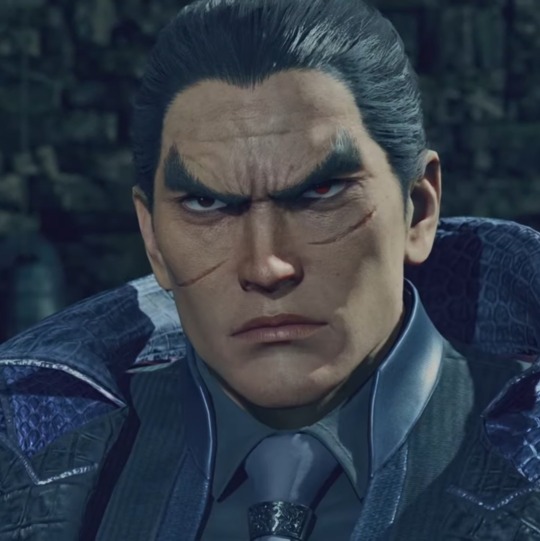
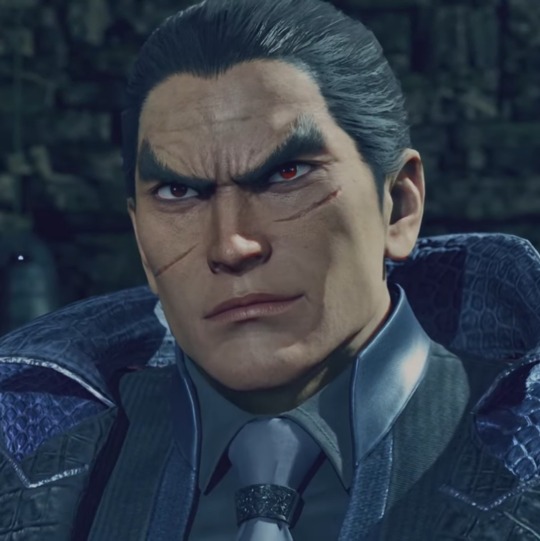
when you finally spot the Low White Red Louis Vuitton Air Force 1 that were missing from your collection
#ITS THE TRAILER SMIRK ITS HIS SPECIAL INTRO WITH JIN TEEHEEHEE#kaz has always been a bit of a smiler but its so. jarring? special? to see his 4k hd tekken 8 model smile like that#also hes smiling AT jin and I know its bc their relationship is so void that he doesnt take jin seriously and its a taunting smile#but also hnhggnhnhggh#theres none of the hatred he had with heihachi here its a playful taunting smile bc its his disappointment of a failson :) teeheehee#“show your old man what youre made of ill put you punk in the fucking ground” type smile#tagging later#tekken
71 notes
·
View notes
Text
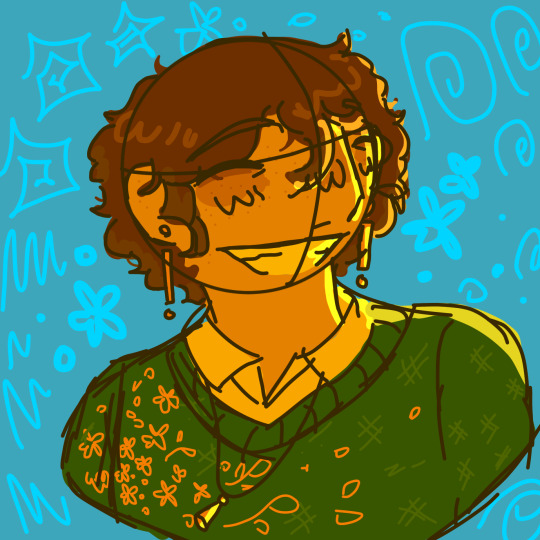
@enlighten3d its your boy :0 (i’ve associated josh with you nowwwww/pos) BUT YEAHHH i think this’ll be his artfight profile like. thumbnail :] yipeee
#i like this drawing its simple :D#i wanted to draw more today however i am tired#more ideas tomorrow#me thinks#but also lime i mayyy have stolen your sweater design and given him the flowers on one side since thats also easier to draw#if that is okkk#waugh its my special boyy#i need to draw him more actually#thoughts in the void#my ocs#oc tag#cryptid hunter blabs#artists on tumblr#my art
13 notes
·
View notes